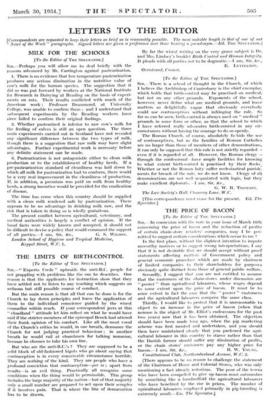LETTERS TO THE EDITOR
{Correspondents are requested to keep their letters as brief as is reasonably possible. The most suitable length is that of one of our " News of the Week" paragraphs. Signed letters are given a preference over those bearing a pseudonym.—Ed. THE SPECTATOR.] MILK FOR THE SCHOOLS [To the Editor of THE SPECTATOR.] SIR,—Perhaps you will allow me to deal briefly with the reasons advanced by Mr. Carrington against pasteurization.
1. There is no evidence that low-temperature pasteurization produces any serious diminution in the nutritive value of cow's milk for the human species. The suggestion that it did so was put forward by workers at the National Institute for Research in Dairying at Reading on the basis of experi- ments on rats. Their results conflicted with much of the American work ; Professor Drummond, at University College, was unable to confirm them ; and I understand that subsequent experiments by the Reading workers have since failed to confirm their original findings.
2. Whether pasteurized is inferior to raw cow's milk for the feeding of calves is still an open question. The three main experiments carried out in Scotland have not revealed any significant difference between the two types of milk, though there is a suggestion that raw milk may have slight advantages. Further experimental work is necessary before any definite statement can be made.
3. Pasteurization is not antagonistic either to clean milk production or to the establishment of healthy herds. If a
pre-pasteurization standard of Cleanliness was laid down to which all milk for pasteurization had to conform, there would be a very real improvement in the cleanliness of production.
If, in addition, a premium was paid on milk from healthy herds, a strong incentive would be provided for the eradication of disease.
The time has come when this country should be supplied with a clean milk rendered safe by pasteurization. There appears to be no advantage in drinking milk raw, and the risk that is taken in doing so is wholly gratuitous.
The present conflict between agricultural, veterinary, and medical authorities is largely a conflict of opinion. If the basal facts were widely known and accepted, it should not be difficult to devise a policy that would command the support of all parties.—I am, Sir, &c., G. S. WILSON. London School of Hygiene and Tropical Medicine, Keppel Street, W.C. 1.








































 Previous page
Previous page